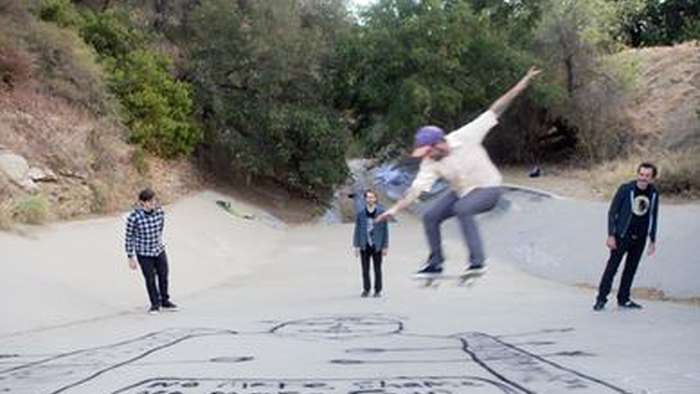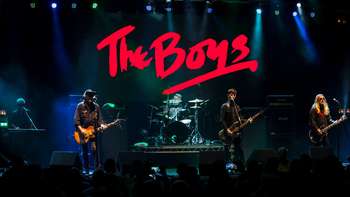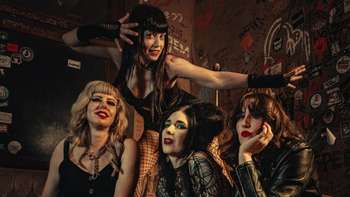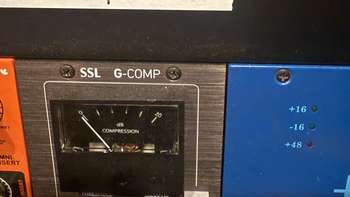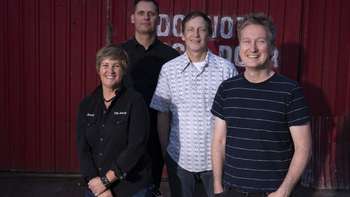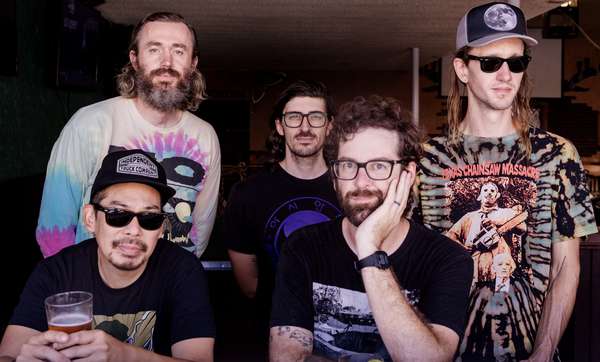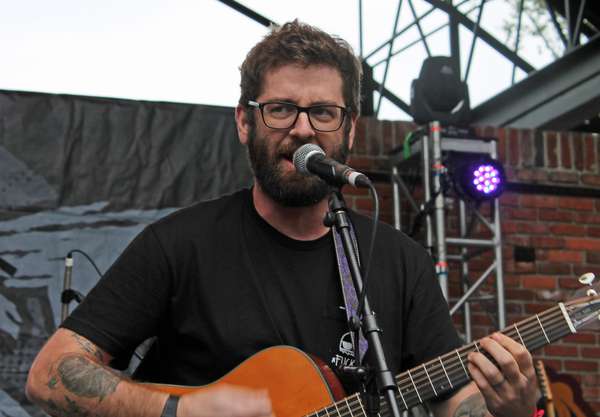“The van was completely broken but I knew that there was no way I was going to miss the show. So I was skateboarding down the side of this freeway. It was the only option I could think of and there are these eighteen-wheelers flying pass me on the side going like…I don’t know how fast they were going. But fast. And there is a part of me that knows if I steer wrong I’m going to be flattened by a truck, but there is another part of me that knows how cool this is, because every time a truck passes I get this gust of wind at my back and I start going faster. There might be a metaphor there but I can’t quite think of what it is.”
“Did you make the gig?”
“Yeah, man. Of course.”
That was the conversation two minutes into my interview with Sean Bonnette, frontman/guitarist of the band AJJ (formerly know as the Andrew Jackson Jihad). Bonette was playing a solo show that night at Lee’s Palace in Toronto while his band dealt with finding transportation for the rest of the tour.
I had put together a series of questions regarding AJJ’s latest record the excellent Bible 2, an eleven-track folk punk opus on self-acceptance and forgiveness in the wake of adolescence, but from the onset my conversation with Bonnette took its own direction. The singer was soft spoken, self-deprecating, and funny. He was less interested in self-promotion than actually trying to connect. That disposition speaks to one of the reasons why AJJ’s fans have such an intense devotion to the band. Bonette gave the impression that he is intensely himself in whatever situation he is in, whether that’s connecting in conversation or skateboarding down a freeway.
Our chat lasted for the better part of an hour, and while we covered a lot of ground, what got lost was a lot of talk about the music specifically. Instead this excerpt from our conversation hits on the bigger themes of why Bonnet’s music is as good as it is.
Scene Point Blank: On the front of ", on the cover that you drew, there are the words: No more Shame, No more Fear, No more Dread." Those words are found throughout the record. They’re a mantra. Why did you write that?
Sean Bonnette: To self-sooth. I can’t remember which thing made me want to write that, but I draw pictures a lot. That’s one of the things that I discovered I liked to do after Christmas Island. It helps me out. In drawing pictures I oftentimes include little phrases like "No More Shame, No More Fear, No More Dread" or "Not Even Jesus Could Stop Me." Those little phases would appear in my writing and my drawing and then it turns out that they were songs. That was like stress-ball shit over my family and family issues. "No More Shame, No more Fear, No more Dread." It pretty clearly points to Catholicism. Stuff like that.
Scene Point Blank: One of the things I’ve always related to in your lyrics is the religious imagery. I grew up in youth groups and still have a fractured relationship with God. Can you talk a bit about your relationship with belief?
Sean Bonnette: There came a time when I realized that the God I want to believe in understands where I’m coming from and has the same sensibilities as I do. So blasphemy wouldn’t upset my God. Blasphemy would be like…if I’m created in God’s image than God doesn’t take himself very seriously. That’s awesome that you were in youth groups. Can I ask you a question: In the youth room at your church was there ever a poster that had a list of secular bands and then a separate list with their corresponding Christian rock or Christian rap bands? If you like Radiohead you should check out Fono, because they’re like Radiohead but Christian. If you like MXPX you should listen to American Made because they’re like MXPX only Christian.
Scene Point Blank: Wasn’t MXPX already a Christian band?
Sean Bonnette: Hey there brother, we’re all Christians really. Do you like Limp Bizkit?
Scene Point Blank: Sure.
Sean Bonnette: Well you should check out P.O.D. because they’re Christian!
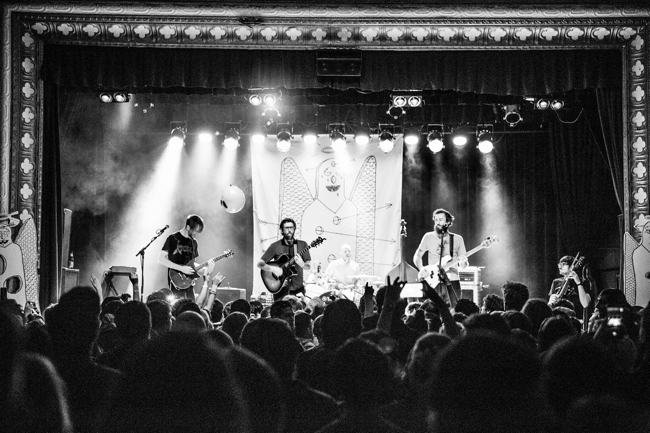
Scene Point Blank: When I was in ninth grade my youth group drove six hours to see a Third Day concert in Detriot. It was this huge thing. The band had sold out an arena. During the concert all the other kids and my section was tongue speaking and weeping. I looked around and I couldn’t get into it. I wanted to, but even at that age I knew that Third Day fucking sucked.
Sean Bonnette: Damn, not even Jesus could save Third Day from being whack. That poster…I had some non-denominational buddies who peer pressured me into going to church when I was in middle school. I saw that and it offended me on such a deep level. That there was a poster that would try and take you away from all of those great bands and replacing them with what?
Scene Point Blank: I think that I was drawn to church and drawn to punk for very similar reasons. I wanted a set of values and I wanted a community.
Sean Bonnette: Hell yeah. Community wherever you can get it is a really amazing thing. I honestly have nothing against Christianity whatsoever, though I do enjoy poking fun. I do have a problem with Christian rock though. I think all music is a testament to the glory of God whether it’s Christian or not. That’s one of the things that pushed me away from going with those buddies to the non-denominational church. That’s kind of what that song "White Worms" is about on the new record. It’s about journey or anyone who tries to sell you on the idea that you need to feel good right now.
It’s weird putting together the community thing with the writing. I think the writing is best when it’s self-discovery. The solitude thing. When it does go to people and people hear it I’m obviously happy about it. I like when it connects with others. That’s when I feel like I did a good job writing a song: when people connect with it.
Scene Point Blank: Some of your most popular songs can be a bit sad. Is it weird to have the success of your band linked to your personal struggles?
Sean Bonnette: No, not really. It does get weird when…if there is a song that I don’t feel like playing any more that’s tough.
Scene Point Blank: You’ve said that you don’t ever want to play anything off the first record.
Sean Bonnette: Yeah, but that isn’t so much about personal struggles as the fact that those are the first songs I ever wrote. I don’t think anyone wants the first anything they did sticking with them for their whole life. It’s like looking at their yearbook. I’ve said that before. It’s like singing all the things you wrote in your yearbook as a seventeen year-old: all this uncool shit that you would never want to bring with you into your thirties. But I guess there are heavy songs or really bitter songs about people that I’ve since forgiven. That’s where it gets weird or hard. I wish I could give a blanket “I’m sorry” to everyone who comes to a show and doesn’t hear a song they’d want to hear, but that’s kind of the selfishness of the medium.
"I wish I could give a blanket “I’m sorry” to everyone who comes to a show and doesn’t hear a song they’d want to hear, but that’s kind of the selfishness of the medium."
Scene Point Blank: You’ve talked about in previous interviews about how with this record and after hitting thirty you’ve mellowed out a bit. What did you mean by that?
Sean Bonnette: Hitting thirty, or going from the mid to late twenties, is awesome because all the artifice slips away. You don’t really care what other people think. You don’t really care about having friends. When you’re in early twenties you’re wagging your tail. You want to meet as many people as you can, and I hope this doesn’t come off as patronizing, but when I was younger I cared so much about what people thought about me, and in doing so I was less true to myself. Now that I’m older -– now that I hit the thirty mark -– I don’t need that many friends. I just need good friends. Friends I can call up. Friends that I can even go without seeing for a bit and they know that I love them. People who that whenever I do reconnect with, it’s all still awesome and the same.
There is this really great No Doubt album called Return to Saturn. The title comes from some astrological thing about Saturn's return in the sky every thirty years. The metaphor is talking about the stuff that you liked before you were an adult coming back to you. It’s like a big change, or a reaffirmation of who you are. That’s supposed to come around the time you hit thirty. I’ve experienced it by rediscovering my love skateboard and of drawing and making art. I stopped caring as much about socializing or meeting new people.
Scene Point Blank: And skateboarding means that you can make the gig.
Sean Bonnette: You can almost always make the gig, really.
